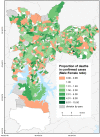Male sex rather than socioeconomic vulnerability as a determinant for COVID-19 death in Sao Paulo: A population-based study
- PMID: 35756353
- PMCID: PMC9218439
- DOI: 10.1177/20503121221105583
Male sex rather than socioeconomic vulnerability as a determinant for COVID-19 death in Sao Paulo: A population-based study
Abstract
Objectives: To determine the role of the male sex as a risk factor for coronavirus disease deaths in Sao Paulo and to what extent socioeconomic vulnerability and individual health issues can interfere in such risk.
Methods: The primary cause of death, age, sex, comorbidities, and code of the Human Development Units of the residence of 37,583 individuals in Sao Paulo, Brazil, were obtained from the records on confirmed coronavirus disease resident hospitalizations of the city of Sao Paulo from the National Influenza Surveillance Information System. A social vulnerability index was assigned to each Human Development Unit. Using "death" as the outcome variable and sex, admission to the intensive care unit, obesity, renal and heart diseases, diabetes, and social vulnerability as confounders, the odds of death for males and females were compared via logistic regression.
Results: The odds of death for males were 1.242 (confidence interval 95% = 1.237, 1.247) times the corresponding odds for females with the same values for all confounders. We estimated the odds of death for patients living in regions with high social vulnerability as 2.243 (CI 95% = 2.151, 2.339) times the corresponding odds of patients living in regions with very low social vulnerability with the same values of the remaining variables.
Conclusion: The male:female death ratio by severe acute respiratory syndrome coronavirus 2 infection in Sao Paulo cannot be attributed only to comorbidities or social vulnerabilities. Our results suggest that the male sex is an independent biological risk factor for coronavirus disease death. Besides sex-specific factors, further research should focus on crucial biological factors in male sex coronavirus disease mortality.
Keywords: coronavirus disease; male sex; men’s health; mortality; severe acute respiratory syndrome coronavirus 2.
© The Author(s) 2022.
Conflict of interest statement
Declaration of conflicting interests: The author(s) declared no potential conflicts of interest with respect to the research, authorship, and/or publication of this article.
Figures


Similar articles
-
Severe Acute Respiratory Syndrome by SARS-CoV-2 Infection or Other Etiologic Agents Among Brazilian Indigenous Population: An Observational Study from the First Year of Coronavirus Disease (COVID)-19 Pandemic.Lancet Reg Health Am. 2022 Apr;8:100177. doi: 10.1016/j.lana.2021.100177. Epub 2022 Jan 7. Lancet Reg Health Am. 2022. PMID: 35018359 Free PMC article.
-
Multicity study of air pollution and mortality in Latin America (the ESCALA study).Res Rep Health Eff Inst. 2012 Oct;(171):5-86. Res Rep Health Eff Inst. 2012. PMID: 23311234
-
Vulnerability to heat-related mortality in Latin America: a case-crossover study in Sao Paulo, Brazil, Santiago, Chile and Mexico City, Mexico.Int J Epidemiol. 2008 Aug;37(4):796-804. doi: 10.1093/ije/dyn094. Epub 2008 May 29. Int J Epidemiol. 2008. PMID: 18511489 Free PMC article.
-
Comorbidity, poverty and social vulnerability as risk factors for mortality in pregnant women with confirmed SARS-CoV-2 infection: analysis of 13 062 positive pregnancies including 176 maternal deaths in Mexico.Ultrasound Obstet Gynecol. 2022 Jan;59(1):76-82. doi: 10.1002/uog.24797. Epub 2021 Dec 17. Ultrasound Obstet Gynecol. 2022. PMID: 34672382 Free PMC article.
-
Mortality and cause of death among first-generation Japanese in São Paulo, Brazil.Int J Epidemiol. 1989 Sep;18(3):647-51. doi: 10.1093/ije/18.3.647. Int J Epidemiol. 1989. PMID: 2807668
Cited by
-
Body mass index and sex differences for mortality in hospitalized COVID-19 patients: a path analysis using a brazilian national database.BMC Public Health. 2023 Aug 29;23(1):1655. doi: 10.1186/s12889-023-16218-1. BMC Public Health. 2023. PMID: 37644418 Free PMC article.
References
-
- The Lancet. Gender and health are also about boys and men. Lancet 2018; 392: 188. - PubMed
LinkOut - more resources
Full Text Sources

